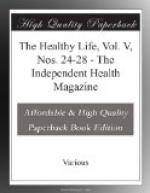In very severe cases of seasickness, the stomach of the patient should be emptied and washed out at once. This is usually an easy matter. Have the patient drink one or two glasses of water, warm or cold, with a little salt or bi-carbonate of soda added—say a teaspoonful to a pint of water. This will have the desired result! In extreme cases of seasickness, dry cold, such as ice-bags, placed behind and about the ears, will sooth the patient, and help to allay his suffering. Cold cloths to the forehead will also prove helpful. Full baths had best be omitted, until the attack has worn off, as they are injudicious on account of the reactions they induce.
In prolonged cases of seasickness, there is often a craving for acids and fruit juices. The continued absence or diminution of the acid contents of the stomach, and the privation from normal food, accounts in part for this, and it is highly proper to satisfy such a craving—providing due care is taken not to add to the stomach’s distress by taking too much juice, or the juice of unripe fruit, or by swallowing the fibre of the fruit, which is allowable only when recovery is complete.
HEREWARD CARRINGTON.
IMPORTANT.
If readers who possess copies of the first number
of The Healthy
Life (August 1911) will send them to the
Editors, they will receive,
in exchange, booklets to the value of threepence
for each copy.
A SYMPOSIUM ON UNFIRED FOOD.
In the November number we published a letter from a reader containing the excellent suggestion that readers who had experimented to any fair extent with unfired diet should be invited to contribute to a conference on the subject in THE HEALTHY LIFE_, and that the symposium should be gathered round the following points_:—
(1) The effect of the diet in curing chronic disease.
(2) Its effect on children so brought up—e.g.
do they get the
so-called “inevitable” diseases
of chicken-pox, measles, etc., and
especially have they good (i.e.
perfect) teeth?
(3) The effect of the diet in childbirth.
(4) The cost of maintaining a household in this
way, as compared with
the cost under ordinary conditions.
(5) Is the diet satisfying, or is there a longing
for conventional
dietary (often found amongst food reformers)?
(6) Is the diet quite satisfactory in winter?
Two letters were published in the January number. Two more in February. Others will appear in future issues. We are anxious to receive a large number of personal experiences, but they must be brief, and classified under the above heads as far as possible.—[EDS.]
ST ALBANS.




